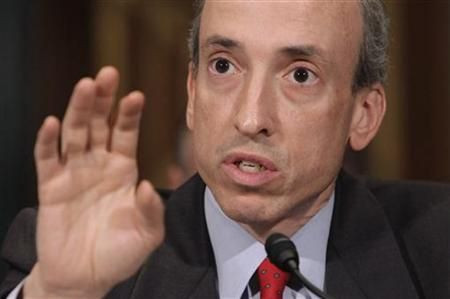Senators Blast CFTC, Gensler for MF Global Mess

Republican lawmakers blasted the chairman of the U.S. futures regulator Thursday for his agency's role in the collapse of MF Global and called his recusal from the investigation a way to "avoid the heat."
The Commodity Futures Trading Commission and its chairman, Gary Gensler, are under pressure because of the quick collapse of the futures brokerage and for allegedly not policing the firm's bookkeeping closely enough.
Investigators are searching for as much as $1.2 billion in missing customer money, which regulators have said the firm may have diverted for its own needs.
Gensler recused himself from the CFTC's probe into MF Global after it filed for bankruptcy on Oct. 31. Gensler and Jon Corzine, who resigned as chief executive of MF Global last month, worked together at Goldman Sachs Group Inc in the 1990s.
"It looks to me like you're trying to avoid the heat," Sen. Mike Johanns, R-Neb., said of Gensler's decision to remove himself from the MF Global investigation. "You certainly didn't recuse yourself all of the other weeks and months and days while MF Global was doing what it was doing."
Gensler defended himself before the Senate Agriculture Committee, saying that, while he did not recuse himself immediately, he did so as soon as the CFTC prepared for possible civil and criminal charges.
"Lawyers assured me there was no legal or ethical reasons, but I thought it could be a distraction in the media and the press," Gensler told lawmakers.
MF Global Holdings Ltd filed for bankruptcy in late October, after $6.3 billion in risky bets on European sovereign debt spooked investors and an effort to sell the firm failed.
Thursday's hearing was the first in a series that will examine whether regulators could have done more to prevent the failure and protect investors, traders and farmers who may be out hundreds of millions of dollars.
The House Agriculture Committee, which is having a hearing on Dec. 8 to examine the MF Global bankruptcy, is meeting on Friday to consider whether to issue a subpoena "to compel the attendance of a witness."
Rep. Frank Lucas, R-Okla., chairman of the House panel, did not specify any one individual, but said it has not received confirmation of attendance from all witnesses for the hearing.
Before the collapse, MF Global had nearly a half dozen regulators policing various parts of the firm, including the CFTC, the Securities and Exchange Commission and industry watchdogs such as the Chicago Mercantile Exchange. But no single regulator was responsible for the whole company.
"We need to get to the bottom of exactly what happened with MF Global," said Sen. Pat Roberts of Kansas, the top Republican on the Senate Agriculture Committee. "Unfortunately, the manner in which Mr. Gensler chose to step aside and recuse himself has raised more questions than it has answers."
'CAN I REPEAT THAT?'
Committee Chairwoman Debbie Stabenow, D-Mich., pressed Gensler and SEC Chairman Mary Schapiro on why the firm had gotten clean bills of health just months before its failure and the revelation of its messy books.
The regulators said their ability to check the firm was limited because they have few resources and are forced to rely on industry watchdogs.
In the case of the CFTC, the agency does not examine any of the futures commission merchants itself and instead is 100 percent reliant on self-regulatory organizations to oversee them. Gensler said it is not an ideal system.
"We have 125 futures commission merchants and 40 or 50 of them are large enough to be clearing members at the CME. We don't examine any of them. Can I repeat that?" Gensler asked lawmakers.
"Please do, although it's very concerning," Stabenow replied.
Following MF Global, the CFTC, along with the CME and the National Futures Association, started reviewing FCMs to ensure that customers' funds were being properly segregated from firm money, in accordance with the Commodity Exchange Act and CFTC regulations.
The CFTC, which is examining about a dozen of the biggest FCMs, expects to complete its review this month, said Gensler.
REFORMS IN THE WORKS?
Looking forward, Gensler said the agency is doing a wholesale review to make sure there are enough protections for customer funds.
He said the CFTC plans to vote on Monday on a rule that would end a practice allowing a firm to use a customers' funds to make "proprietary" trades for its own accounts, a complex process where the firm basically gives a loan to itself. The practice is legal today.
The agency also is looking at whether audits can be improved.
"What we're doing at our agency is turning over every rock in every corner as to the rules and what we can do better, and being self-reflective because we know that this has to be better," Gensler said.
Schapiro said her agency will do a "lessons-learned review" on MF Global.
But she warned extra rules cannot always prevent bad acts.
"What broke down here was the framework for the protection of customer assets based on the actions by this firm which ... may well have been illegal," she added.
(Editing by Andre Grenon)
© Copyright Thomson Reuters {{Year}}. All rights reserved.





















